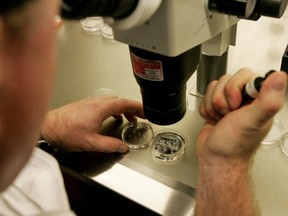Science
Scientists Create Fertilizable Eggs from Skin Cells in Landmark Study

A team of scientists has successfully transformed human skin cells into fertilizable eggs, marking a significant milestone in reproductive science. This groundbreaking achievement, announced on October 18, 2023, could potentially offer new avenues for those facing infertility, affecting approximately one in six people globally.
The research, led by scientists from the United States, involved a sophisticated process known as in-vitro gametogenesis (IVG). Although the technology is still years away from practical application, it raises hopes for individuals and couples who wish to conceive but face biological limitations. As noted by co-author Paula Amato from the Oregon Health & Science University, this innovation could enable older women or those without viable eggs to have genetically related children.
Breakthrough in Reproductive Technology
The study, published in the journal Nature Communications, represents a leap forward in reproductive technology. Previously, researchers had success using animal cells, but this is the first instance of utilizing human DNA. The process began with the removal of nuclei from skin cells, which were then transferred into donor eggs from which the original nuclei had been removed. This method, known as somatic cell nuclear transfer, was famously used in 1996 to clone Dolly the sheep.
A significant challenge in this research was the difference in chromosome numbers between skin cells and eggs. Skin cells contain 46 chromosomes, while eggs have only 23 chromosomes. To address this, the team developed a technique referred to as “mitomeiosis,” which replicates the natural process of cell division. This innovative process resulted in the creation of 82 developing eggs, known as oocytes, which were then fertilized using sperm through in vitro fertilization (IVF).
After six days of development, less than 9% of the embryos reached a stage suitable for transfer to the uterus. While this percentage is relatively low, researchers pointed out that typical natural reproduction sees only about one-third of embryos reach the IVF-ready “blastocyst” stage. Despite this progress, the experiment was halted due to observed abnormalities in the embryos.
The Future of Fertility Treatments
Experts are optimistic about the implications of this research. Ying Cheong, a reproductive medicine researcher at the University of Southampton, described the findings as “exciting.” She noted that this is the first time scientists have demonstrated that DNA from ordinary body cells can be successfully integrated into an egg, activated, and correctly halved to form viable gametes. Cheong emphasized that while this work is still in its infancy, it could transform our understanding of infertility and miscarriage.
Alternative approaches to creating eggs in the laboratory are also being explored. Some researchers focus on reprogramming skin cells into induced pluripotent stem cells, which can develop into any cell type, including eggs. Amato noted that it remains uncertain which method will prove more effective, but both avenues are still far from clinical application.
The research followed established ethical guidelines in the United States regarding embryo use, reflecting a commitment to responsible scientific practice. Amato estimates that it will take at least a decade before this technology becomes widely available to those seeking to start families.
As science continues to advance in this domain, the potential for new fertility solutions offers hope to many who have long desired the opportunity to conceive. The ongoing research underscores the importance of continued exploration in reproductive technologies, with the aim of making these innovations accessible to those in need.
-

 Science3 months ago
Science3 months agoToyoake City Proposes Daily Two-Hour Smartphone Use Limit
-

 Top Stories3 months ago
Top Stories3 months agoPedestrian Fatally Injured in Esquimalt Collision on August 14
-

 Health3 months ago
Health3 months agoB.C. Review Reveals Urgent Need for Rare-Disease Drug Reforms
-

 Technology3 months ago
Technology3 months agoDark Adventure Game “Bye Sweet Carole” Set for October Release
-

 World3 months ago
World3 months agoJimmy Lai’s Defense Challenges Charges Under National Security Law
-

 Lifestyle3 months ago
Lifestyle3 months agoVictoria’s Pop-Up Shop Shines Light on B.C.’s Wolf Cull
-

 Technology3 months ago
Technology3 months agoKonami Revives Iconic Metal Gear Solid Delta Ahead of Release
-

 Technology3 months ago
Technology3 months agoApple Expands Self-Service Repair Program to Canada
-

 Technology3 months ago
Technology3 months agoSnapmaker U1 Color 3D Printer Redefines Speed and Sustainability
-

 Technology3 months ago
Technology3 months agoAION Folding Knife: Redefining EDC Design with Premium Materials
-

 Business3 months ago
Business3 months agoGordon Murray Automotive Unveils S1 LM and Le Mans GTR at Monterey
-

 Technology3 months ago
Technology3 months agoSolve Today’s Wordle Challenge: Hints and Answer for August 19









